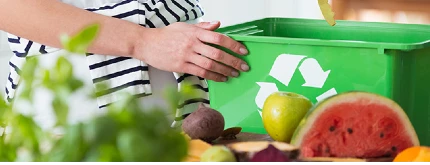For the incredible effect of having lush landscapes - adding compost to your lawn is essential. Anyone who intends to support the radiant health of your landscapes - will need to generate compost for optimal organic fertilization.

What Exactlyis Compost?
Compost is used for lawn seeding, and for enhancing your soil with life affirming nutrients that cause your landscapes to glow. Adding compost to your lawn, also known as top dressing, is a natural fertilizing method that can be done by you or a professional for healthier grass. It is a very simple process to learn. The Grounds Guys® can help get your composting project started.
All you need are kitchen scraps, including:
- vegetable and fruit peelings
- eggshells
- coffee grounds
- tea bags
You can also use household waste, such as:
- paper towels and napkins
- paper bags
- cardboard boxes
- coffee filters
And you can use your yard waste:
- raked leaves
- grass clippings
- dead (but not diseased) plants
Do Not Use These Items:
- Meat
- Bones
- Fats, oils
- Dairy products
- Pet waste
The Secret "Glowing Lawn" Recipe
Left alone in nature, all organic matter eventually decomposes. But to speed things up a bit, use a recipe that includes "browns" and "greens" in a certain mix. "Browns" are things like dead leaves that are high in carbon, and "greens" are things like vegetable peelings that are high in carbon.
As close as possible, maintain a compost pile with a ratio of 4:1 -- 4 parts of "brown" ingredients and 1 part of "green ingredients." With these proportions, the components decompose quicker and lack offensive odors.
Top Dressing: The Benefits of Composting for Your Lawn
- Breaks up heavy soil. If your clay soil is so heavy and compacted that plant roots don't stand a chance at penetrating it, tilling or spading compost into the soil loosens it up. Plant roots can penetrate the soil more easily, and the soil drains better.
- Bulks up sandy soil. If your soil is so sandy that water flows too quickly away from plant roots, adding compost gives the soil substance, which increases water retention.
- Sustains beneficial microorganisms. Underneath the surface of the soil is an environment that, ideally, should be teeming with beneficial microorganisms, such as certain fungi and bacteria. These microbes are the unsung workhorses of garden soil, fixing nitrogen in the soil, digesting organic matter and converting it into usable nutrients for plants. Compost helps feed this microbial community.
Maintaining, Agitating, Turning
Aeration is essential in composting. Keeping a pile oxygenated speeds decomposition and minimizes odors. You can use a pitchfork or shovel to turn the pile; simply insert the tool into the pile, lift the contents and turn them over -- as if you were flipping a hamburger.
As you turn the whole pile, add water if needed until it's slightly damp, similar to a wet sponge that you've squeezed until the water no longer flows from it.
Transformation from Garbage to Gold
Once your compost pile is dark and crumbly, and you can no longer recognize the original components, it's "done" and ready to use as enhancement fertilization in your garden. If you are interested in learning about other landscaping topics, visit The Grounds Guys’ blog.
If you are ready to enhance the visual and environmental quality of your landscape - The Grounds Guys® are the most well respected among the professionals. This is because of our dedication to educational and sustainable environmental progress. If you have any question at all - or simply want professionals to handle your composting and fertilizing - just contact us today.